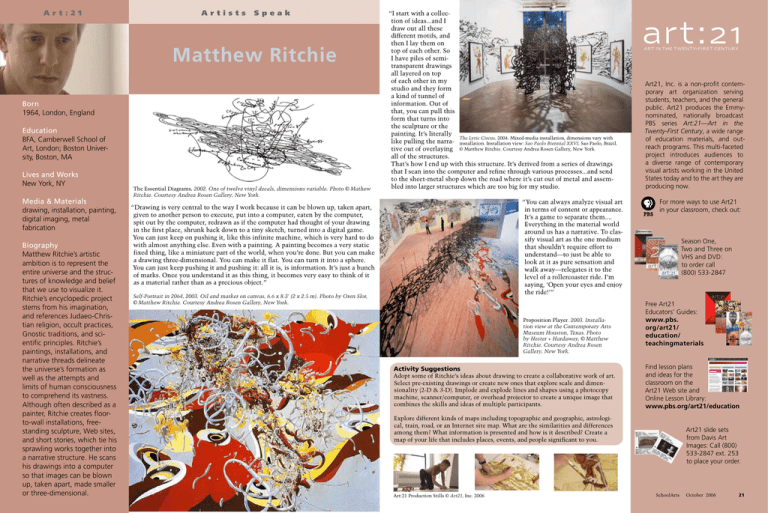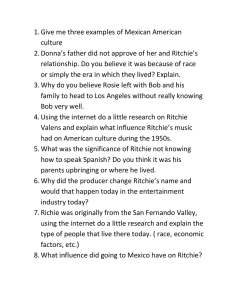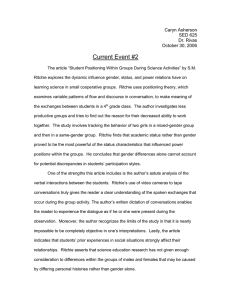Matthew Ritchie
advertisement

A r t : 2 1 Artists Speak Matthew Ritchie Born 1964, London, England Education BFA, Camberwell School of Art, London; Boston University, Boston, MA Lives and Works New York, NY Media & Materials drawing, installation, painting, digital imaging, metal fabrication Biography Matthew Ritchie’s artistic ambition is to represent the entire universe and the structures of knowledge and belief that we use to visualize it. Ritchie’s encyclopedic project stems from his imagination, and references Judaeo-Christian religion, occult practices, Gnostic traditions, and scientific principles. Ritchie’s paintings, installations, and narrative threads delineate the universe’s formation as well as the attempts and limits of human consciousness to comprehend its vastness. Although often described as a painter, Ritchie creates floorto-wall installations, freestanding sculpture, Web sites, and short stories, which tie his sprawling works together into a narrative structure. He scans his drawings into a computer so that images can be blown up, taken apart, made smaller or three-dimensional. The Essential Diagrams, 2002. One of twelve vinyl decals, dimensions variable. Photo © Mathew Ritchie. Courtesy Andrea Rosen Gallery, New York. “I start with a collection of ideas...and I draw out all these different motifs, and then I lay them on top of each other. So I have piles of semitransparent drawings all layered on top of each other in my studio and they form a kind of tunnel of information. Out of that, you can pull this form that turns into the sculpture or the painting. It’s literally The Lytic Circus, 2004. Mixed-media installation, dimensions vary with like pulling the narra- installation. Installation view: Sao Paolo Biennial XXVI, Sao Paolo, Brazil. tive out of overlaying © Matthew Ritchie. Courtesy Andrea Rosen Gallery, New York. all of the structures. That’s how I end up with this structure. It’s derived from a series of drawings that I scan into the computer and refine through various processes...and send to the sheet-metal shop down the road where it’s cut out of metal and assembled into larger structures which are too big for my studio. ART IN THE TWENTY-FIRST CENTURY Art21, Inc. is a non-profit contemporary art organization serving students, teachers, and the general public. Art21 produces the Emmynominated, nationally broadcast PBS series Art:21—Art in the Twenty-First Century, a wide range of education materials, and outreach programs. This multi-faceted project introduces audiences to a diverse range of contemporary visual artists working in the United States today and to the art they are producing now. “You can always analyze visual art in terms of content or appearance. It’s a game to separate them.... Everything in the material world around us has a narrative. To classify visual art as the one medium that shouldn’t require effort to understand—to just be able to look at it as pure sensation and walk away—relegates it to the level of a rollercoaster ride. I’m saying, ‘Open your eyes and enjoy the ride!’” “Drawing is very central to the way I work because it can be blown up, taken apart, given to another person to execute, put into a computer, eaten by the computer, spit out by the computer, redrawn as if the computer had thought of your drawing in the first place, shrunk back down to a tiny sketch, turned into a digital game. You can just keep on pushing it, like this infinite machine, which is very hard to do with almost anything else. Even with a painting. A painting becomes a very static fixed thing, like a miniature part of the world, when you’re done. But you can make a drawing three-dimensional. You can make it flat. You can turn it into a sphere. You can just keep pushing it and pushing it: all it is, is information. It’s just a bunch of marks. Once you understand it as this thing, it becomes very easy to think of it as a material rather than as a precious object.” Self-Portrait in 2064, 2003. Oil and marker on canvas, 6.6 x 8.3' (2 x 2.5 m). Photo by Oren Slor, © Matthew Ritchie. Courtesy Andrea Rosen Gallery, New York. Proposition Player. 2003. Installation view at the Contemporary Arts Museum Houston, Texas. Photo by Hester + Hardaway, © Matthew Ritchie. Courtesy Andrea Rosen Gallery, New York. Activity Suggestions Adopt some of Ritchie’s ideas about drawing to create a collaborative work of art. Select pre-existing drawings or create new ones that explore scale and dimensionality (2-D & 3-D). Implode and explode lines and shapes using a photocopy machine, scanner/computer, or overhead projector to create a unique image that combines the skills and ideas of multiple participants. Explore different kinds of maps including topographic and geographic, astrological, train, road, or an Internet site map. What are the similarities and differences among them? What information is presented and how is it described? Create a map of your life that includes places, events, and people significant to you. Art:21 Production Stills © Art21, Inc. 2006 For more ways to use Art21 in your classroom, check out: Season One, Two and Three on VHS and DVD: to order call (800) 533-2847 Free Art21 Educators’ Guides: www.pbs. org/art21/ education/ teachingmaterials Find lesson plans and ideas for the classroom on the Art21 Web site and Online Lesson Library: www.pbs.org/art21/education Art21 slide sets from Davis Art Images: Call (800) 533-2847 ext. 253 to place your order. SchoolArts October 2006 21


